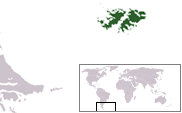Dusicyon australis
| Falkland Islands wolf | |
|---|---|
 |
|
| Illustration by John Gerrard Keulemans (1842–1912) | |
| Scientific classification | |
| Kingdom: | Animalia |
| Phylum: | Chordata |
| Class: | Mammalia |
| Order: | Carnivora |
| Family: | Canidae |
| Tribe: | Canini |
| Genus: | †Dusicyon |
| Species: | †D. australis |
| Binomial name | |
|
Dusicyon australis (Kerr, 1792) |
|
 |
|
| Location of the Falkland Islands | |
The Falkland Islands wolf (Dusicyon australis), also known as the warrah (/ˈwɑːrə/ WAH-rə or /ˈwɑːrɑː/ WAH-rah) and occasionally as the Falkland Islands dog, Falkland Islands fox, or Antarctic wolf, was the only native land mammal of the Falkland Islands. This endemic canid became extinct in 1876, the first known canid to have become extinct in historical times. It was the only modern species in the genus Dusicyon.
Traditionally it had been supposed that the most closely related genus was Lycalopex, including the Culpeo, which has been introduced to the Falkland Islands in modern times. However, in 2009, a cladistic analysis of DNA identified the Falkland Island wolf's closest living relative as the maned wolf (Chrysocyon brachyurus)—an unusually long-legged, fox-like South American canid, from which it separated about 6.7 million years ago.
...
Wikipedia

